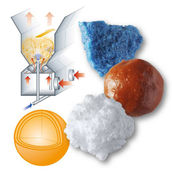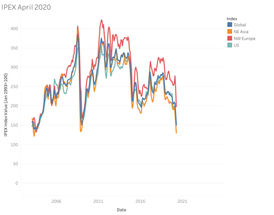BASF raises prices for formic acid and 2-ethylhexanoic acid
Effective immediately, or as existing contracts permit, BASF is raising its prices for formic acid and 2-ethylhexanoic acid by 40 euros per metric ton in Europe.
BASF's customers use formic acid in multiple applications. The eco-efficient acid helps to keep certain feeds fresh and free of salmonellae, removes paints and rust from metallic surfaces and scale from kettles and boilers. In breweries and wineries it disinfects kegs, casks and barrels; applied as an auxiliary in the pharmaceutical and crop protection industry it regulates pH values; in cleaning it acts as dirt remover and disinfectant.
Formic acid salts, the so-called formates, serve as high-class de-icing agents and valuable auxiliaries in oil production. Accroding to the company, BASF is the world's leading producer of formic acid, with production plants at its integrated Verbund sites in Ludwigshafen, Germany, and Nanjing, China.
2-Ethylhexanoic acid is a chemical intermediate for many different industrial applications, for example for the manufacture of plasticizers, PVC stabilizers, lubricants and drying additives for coatings.
Most read news
Topics
Organizations
Other news from the department price development
These products might interest you

Dursan by SilcoTek
Innovative coating revolutionizes LC analysis
Stainless steel components with the performance of PEEK - inert, robust and cost-effective

OCA 200 by DataPhysics
Using contact angle meter to comprehensively characterise wetting behaviour, solids, and liquids
With its intuitive software and as a modular system, the OCA 200 answers to all customers’ needs

Tailor-made products for specific applications by IPC Process Center
Granulates and pellets - we develop and manufacture the perfect solution for you
Agglomeration of powders, pelletising of powders and fluids, coating with melts and polymers

Get the chemical industry in your inbox
By submitting this form you agree that LUMITOS AG will send you the newsletter(s) selected above by email. Your data will not be passed on to third parties. Your data will be stored and processed in accordance with our data protection regulations. LUMITOS may contact you by email for the purpose of advertising or market and opinion surveys. You can revoke your consent at any time without giving reasons to LUMITOS AG, Ernst-Augustin-Str. 2, 12489 Berlin, Germany or by e-mail at revoke@lumitos.com with effect for the future. In addition, each email contains a link to unsubscribe from the corresponding newsletter.











































